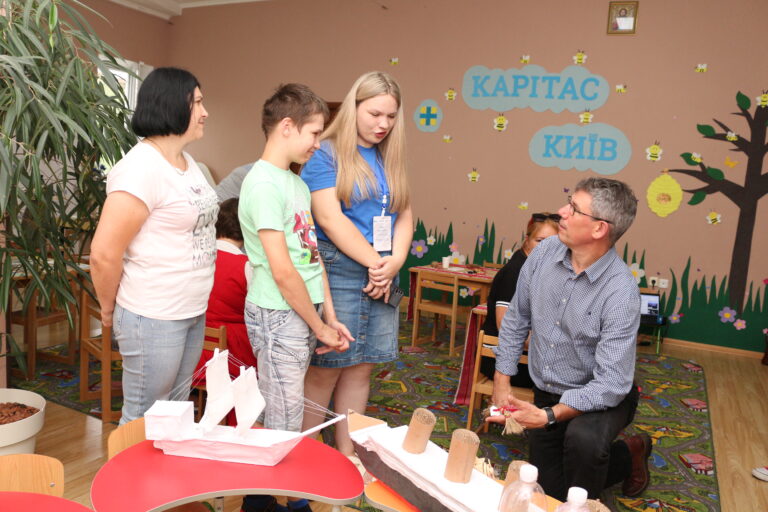Tiredness, exhaustion and the constant disruption of life at the sound of air-raid alarms.
This is one of the images I carry back from my trip to Ukraine from 25 to 28 July. I intentionally made the first visit as Secretary General of Caritas Internationalis to this war-torn country to express the Confederation’s closeness, solidarity and gratitude to the two Ukrainian Caritas organisations, Caritas Ukraine (Greek Catholic) and Caritas-Spes Ukraine (Roman Catholic).
Ukraine is a country where war has become a normal part of everyday life, where if you get into a car, you are never sure of getting to your destination without having to take cover, where you do not know how many hours you will have to stay in a bunker, nor whether you will be able to sleep or be woken up in the middle of the night by air raid alarms. I can’t imagine how all this affects the Ukrainians, who for almost 18 months have also had to endure this, on top of the pain of losing or being separated from their loved ones, the destruction of their country and the atrocity of violence.
The silver lining of my visit was being able to see with my own eyes the effect of the extraordinary response of the two Ukrainian Caritas organisations. Both have had to increase their programmes and also their staff tremendously, yet they have not lost the identity, the very essence of Caritas’ mission: a real sense of care and love for the people they serve.

From my experience in the humanitarian response to the war in Syria, Iraq and many other countries, I know how easy it is for people to get lost in responding to immediate needs. Instead, Caritas’ response, is based on the Church’s tradition of integral human development and considers people in their entirety. There is a whole journey of accompaniment with each individual. And this begins with an encounter with those we serve, through which we learn their real needs, which are not only material but also social, psychological, and spiritual. The people we serve are not mere objects to receive humanitarian assistance; they are at the centre of our action. In this regard, the work of Caritas Ukraine and Caritas-Spes Ukraine is exemplary.
Visiting one of the 15 centres of Caritas Kyiv, I was surrounded by a familiar atmosphere. The war is visible, just outside the centre is a building with the top floors badly damaged by a recent bombing, but inside there is warmth, there is normality. The centre cares for children with learning disabilities. Obviously, they are traumatised by the war. Still, in the centre, thanks to therapy, the children have begun to play again, to interact with others, getting back a little of their childhood. Their parents also feel safe and relieved, after the constant tension of life.
I found the same familiar atmosphere during my visit to Caritas-Spes headquarters, interrupted by an air raid alert. Although this unforeseen event prevented me from visiting their activities as I’d planned, it allowed me to spend time with my colleagues and get to know them, listen to them, and learn more about their work and the reality of living in Ukraine.
Similarly, during the meeting with the partners of Caritas Ukraine, it was great to meet all the directors of the 41 diocesan Caritas of Caritas Ukraine. Coming together for the first time in a group this size since the start of the war, they really appreciated spending time together. Many of them live in remote and isolated areas.
In all these encounters, I unfortunately perceived how war had become the normality and no one thought that peace was in sight. Many people ask the question: What about the future, and how will we rebuild Ukraine? But I’m afraid it is too early to ask that question. We aren’t anywhere near thinking about reconstruction.
Now that conflict has become everyday life, it is necessary to plan with a longer-term perspective. To see how we can help people repair the homes that can still be repaired, to resume their livelihoods and jobs, to help them move on from such a day-to-day existence. In the first wave of the war, the response of the international community was immediate, visceral, and we saw people donating food and clothing and sending trucks with assistance. The challenge, as we enter the second and third eras of war, will be to continue to keep up the support for the Ukrainian people.
Alistair Dutton
